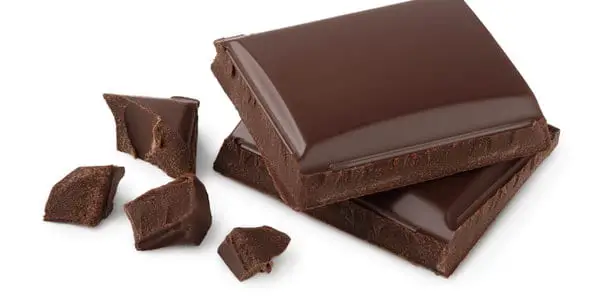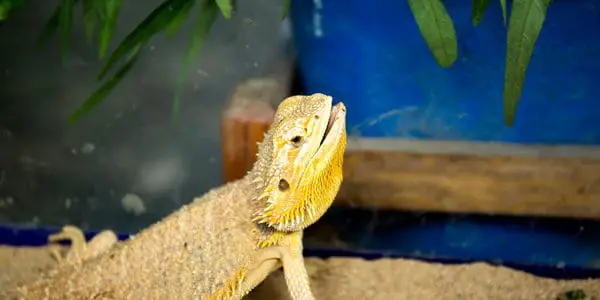Chocolate is a favorite snack to many. It not only has an alluring taste and aroma but is also readily available. Moreover, the delicacy is relatively pocket-friendly considering the nutrition punch it packs.
If you stay with or own a beardie as a pet, you must be wondering: Can bearded dragons eat chocolate? Sorry to break your bubble, but you shouldn’t feed a captive beardie with chocolate even though they can still feast on the treat. Like many processed foods, chocolate contains high levels of refined fat and sugar.
Since caged beardies are generally less active than their wild friends, feeding them chocolate would trigger many health complications such as obesity. On top of this, chocolate is toxic to beardies and most other pets.
Protein is particularly a vital element to the growth of bearded dragons as it fosters proper organ and tissue growth along with strong bone development. In addition to proteins, captive baby and juvenile beardies require substantial amounts of healthy fat, vitamins, and other useful nutrients for rapid and apt growth.
For this reason, many inexperienced beardie owners feed their dragons with chocolate with the bogus hope that it’s a healthy food supplement. Luckily, there are countless other food varieties that are both readily available and healthy to bearded dragons.
Even better, the majority of beardie foods including roaches, superworms, and veggies are sufficiently sweet to tickle your beardie’s taste buds.
What’s the Recommended Diet for Bearded Dragons?
Establishing a healthy diet for a reptile pet such as a bearded dragon is vital to their overall well-being. But that’s just a start. For the dragon to thrive in captivity, you must identify and stick to a suitable feeding schedule.
As a general rule, a bearded dragon’s diet should feature a mix of animal proteins from feeder insects and plant vitamins from veggies, fruits, and other soft fodder.
Furthermore, the captive lizards need a stable supply of essential nutrient supplements such as calcium and vitamins to grow and stay healthy.
And there’s more: As your beardie ages, prepare to adjust their diet according to their changing requirements.
Young beardies are typically ravenous eaters that devour a substantial amount of feeder creepers along with modest quantities of soft veggies. They’re mostly carnivorous as their bodies require high animal proteins and essential fats to beef up body mass during growth.
On the other hand, adult bearded dragons naturally consume more plant matter than animal proteins. At this phase, their bodies have reached full bloom and require marginal protein uptake.
Still, the pets need the proteins to maintain a healthy frame along with plentiful vitamin uptake to fully develop various body mechanisms such as immune, digestive, and lymph systems.
Beyond feeding your lizards a wholesome and adequate diet, ensure all the foodstuffs are fresh and clean. Thus, only supply them with live feeder creepers in the right amounts to avoid unnecessary waste accumulation, contamination, and untimely demise.
You don’t want to miss this vital tip: A wholesome bearded dragon feeding blueprint must uphold 2:1 Calcium to Phosphorus ratio and comprise a mix of approved creepers and veggies. Keep off high-oxalate foods like spinach, raspberries, and kiwi as well as high-Phosphorus rations as both categories offset the Calcium-Phosphorus balance.

Why is Chocolate Bad for a Bearded Dragon?
In spite of its colorful perks, chocolate is toxic for bearded dragons. The delicacy’s nutritional value doesn’t align with the dietary needs of bearded dragons. Here’s why:
1. Energy Levels
Chocolate typically contains approximately 524 to 540 kcal in every 100 grams. Don’t misinterpret this high energy content as beneficial. Unlike wild bearded dragons that burn a considerable amount of calories with heightened physical activity, captive beardies mostly lay around in the tank.
Surplus calories are converted to and stored as fats in the body. In turn, excessive fat deposits result in health complexities like obesity, hypertension, and overweight bodies. Thus, captive beardies should be kept off high-calorie foodstuffs such as chocolate to keep them healthy and happy.
2. Protein Content
Chocolate is high-protein food. You probably already know that young bearded dragons’ bodies require high protein content support their fast-paced growth. At this stage, their frame and various organs are taking shape and developing to support the creatures for the rest of their life.
It’s no wonder baby and juvenile bearded dragons consume more protein matter than vitamins. Nevertheless, chocolate is toxic and unsuitable for beardies. Instead, you’re advised to feed beardies with feeder bugs such as cockroaches, crickets, locusts, and superworms that are both nutritious and safe.
3. Fat Content
High fat content in chocolate is another major reason chocolate is unsuitable for beardies, especially those living in captivity. The limited physical activity means that most of the fat would be deposited in the body instead of being used up.
Possibly one of the ugliest consequences of excess fat in bearded dragon pets is obese and overweight bodies. This is the reason you should reduce the amount and frequency of feeding high-fat foods like waxworms to caged bearded dragons.
4. Intensity of Sugar
As with many other processed foods, the intensity sugar chocolate is off the charts, thus inappropriate for beardie pets. In addition to being intolerably sweet, feeding this treat to bearded dragons would present multiple health risks as in the case with high-energy foods.
In most instances, high-sugar foods contain elevated energy levels. When this energy isn’t used up, it’s converted to body fat and then deposited on strategic body parts like the back, tummy, and neck. Oftentimes, this culminates in severe health challenges like obesity.
5. Phosphorus to Calcium Ratio
Typically, an ideal bearded dragon diet features optimal Phosphorus to Calcium ratio of 2:1 to support sound development of various body structures including bones. Unfortunately, this ratio is imbalanced in chocolate, meaning the delicacy is unfit for uptake by bearded dragons.
Foods with high Phosphorus levels deplete calcium levels in a beardie’s body, resulting in calcium-deficiency. Consequently, your bearded companion becomes susceptible to grave health complications such as metabolic bone disease that’s characterized by brittle bones, a deteriorating appetite, heightened tension and stress levels, along with labored walking.
6. Vitamin Composition
Chocolate is a rich source of vitamin A. True, the lizards need vitamin A for all-round healthy growth and living.
However, excessive amounts of the element cause a myriad of health conditions such as vitamin A toxicity. This complication mostly results from excessive oral vitamin A supplementation.
Luckily, you can save your beardie buddy from vitamin A toxicity simply by shunning oral vitamin A supplements if the standard diet already contains high levels of the vitamin.
7. Caffeine Concentration
Similar to tea and a few other stimulant beverages, chocolate contains high levels of caffeine. Equally, chocolate is unsafe for beardie pets.
Can Bearded Dragons Eat Chocolate Cake?
Chocolate cake is bad for bearded dragons for three main reasons:
- It contains chocolate which is unsuitable for beardie feeding.
- Like other cakes, chocolate cake is extremely sweet, thus unfit for beardie dragon lizards.
- The cake falls under the category of cooked foods, therefore is inappropriate for feeding beardie pets.
Rather than risk your pet’s health by feeding them chocolate cake, bolster their wellbeing by supplying natural, fresh, and raw foods. These foods are both nutritionally sound and safe for your beardie to enjoy.

Conclusion
There’s no denying the charm of chocolate. The delicacy not only boasts an enchanting taste but also packs a host of nutrients. Moreover, chocolate is readily available at fair pocket prices. Nonetheless, the nutritional value of chocolate is largely imbalanced for a beardie’s healthy living.
Thus, owners of captive bearded dragons should desist from sharing a chocolate treat with their pets. Instead, opt for approved live, fresh, and raw beardie foodstuffs like feeder insects and veggies that are safe and healthy to enable your pet reptile to thrive in captivity.
